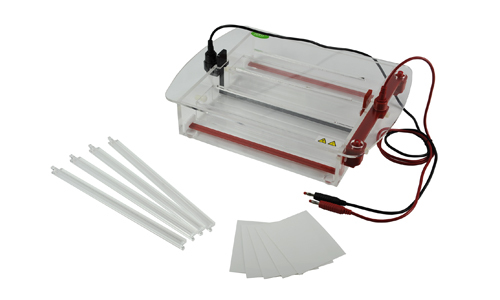Electrophoresis in the laboratory is one of the most important laboratory techniques, of great importance in scientific research; it is a useful tool for separating and purifying molecules such as proteins, nucleic acids and polymers; the electrophoresis procedure is the separation of components of a mixture according to their size and according to their electrical charge.
In this sense, electrophoresis has become a versatile and cost-effective way for scientific analysis, this is carried out by placing the components of a mixture in an electric field, these components are applied with opposite charges that have an opposite force of movement proportional to the charge.
Charges in electrophoresis can be generated by devices such as electrodes, electrochemical cells and batteries
To perform this process the components move through a porous material known as an electroporation gel, some types of gels commonly used in electrophoresis are agarose gel, polyacrylamide gel and polyacrylamide/ammonium sulfate gel.
In addition to separating and purifying molecules, electrophoresis is also used for the separation of blood cells, bacteria and other organisms, this application is known as capillary electrophoresis and is used to detect certain infectious diseases and clinical diagnosis.
Electrophoresis is also used to study the structure of molecules
This can be achieved by comparing the distribution of the radii of different molecules, this is a useful tool to understand the structure and properties of molecules, as well as to identify molecular fractions, electrophoresis is also used in the manufacture of biologics, such as vaccines and pharmaceuticals.
It serves to purify and concentrate these molecules, as well as to separate desired products from unwanted products, which helps not only to improve the quality of biologics, but also to improve their purity and stability.
A common use of electrophoresis is the enzyme activity assay, which is used to quantify enzyme activity in a sample
This is done by placing a sample in an electric field, then measuring the concentration of reaction products generated by the enzymes present in the sample.Electrophoresis is also used to study genetic variability between different organisms by separating alleles (individual genes).
This technique is known as restriction length fragment polymorphism alignment electrophoresis and is used to study genetic variability between different populations.
In summary, electrophoresis is a versatile and cost-effective tool for scientific analysis, with practical applications covering a wide range of fields.
For Kalstein as a MANUFACTURER it is important that you purchase a quality electrophoresis for your laboratory
In the link below you will be able to choose one of the best electrophoresis manufactured in the market HERE
In Kalstein you can acquire the best electrophoresis for that reason we invite you to visit our web page HERE to enjoy great offers and prices without competition, since we are MANUFACTURERS and we can guarantee your effective purchase.

